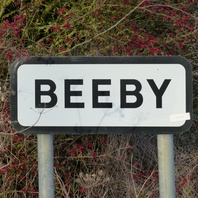
Viking Names
Beeby
Beeby, in the East Goscote Hundred of Leicestershire, is an Anglo-Scandinavian hybrid from Old English beo ‘a bee’ and Old Norse by ‘a farmstead, a village’. The high valuation of Beeby in the Domesday Book has led scholars to believe that it was originally an Anglian settlement taken over and renamed by Scandinavians.
Read More
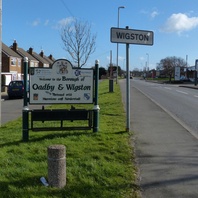
Viking Names
Oadby
Oadby, in the Guthlaxton Hundred of Leicestershire, likely comes from the Old Norse male personal name Auði (Old Danish Øthi) which appears as Owði in the Liber Vitate of Thorney Abbey. A potential alternative for the first element is Old Norse auðr ‘wealth, riches’, which might refer to the easily worked and fertile glacial sand and gravel on which Oadby lies. The second element of the place-name is Old Norse by ‘farm, settlement’. It is now a joint village with Wigston Magna.
Read More
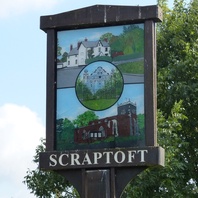
Viking Names
Scraptoft
There are two possibilities for the first element of Scraptoft, in the Gartree Hundred of Leicestershire. The first suggestion is that it is the Old Norse male personal name Skrápi (genitive singular Skrápa). Alternatively, the specific could be the Old Norse element skrap ‘scraps, scrapings’ potentially referring to arid barren soil which may be related to Modern Norwegian skrapmark ‘land thinly covered by grass’. This would be topographically appropriate as the settlement lies on a small area of sand and gravel on top of boulder clay. The second element of the name is Old Norse toft ‘building plot, homestead, curtilage’.
Read More
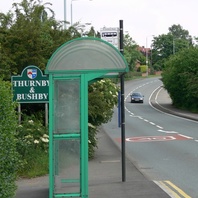
Viking Names
Thurnby
Thurnby, in the Gartree Hundred of Leicestershire, probably derives from Old Norse þyrne, þyrnir, þyrni ‘a thorn-bush’ and Old Norse by ‘a farmstead, a village’. It is also possible that the specific element is the Old Norse byname Þyrnir. However, when taken with the neighbouring parish Bushby these names appear to record an area of former scrubland. This land remained poorly exploited until the period of Scandinavian settlement. Some earlier spellings of the name show substitution of Old English þorn ‘a thorn-tree’ as the first element. Thurnby is now a joint parish with Bushby.
Read More

Viking Names
Ravensdale Park
Ravensdale Park, in the Appletree Hundred of Derbyshire, clearly derives its name from either the bird or a person with a name that corresponds to that of the bird, but its linguistic origin is difficult to pin down because of the similarities between Old Norse and Old English. The first element could be Old Norse hrafn ‘raven’, or the Old Norse male personal name Hrafn, or Old English hræfn ‘raven’, or the Old English male personal name Hræfn. The second element is either Old Norse dalr ‘valley’ or Old English dæl ‘a pit, a hollow; later a valley’. It was one of the parks of Duffield Frith hence the later affix ‘park’. In the Nottinghamshire place-name Ranskill, the first element is more likely to be Old Norse as the second element is also in that language, but the difficulty of deciding between the bird and the personal name Hrafn is the same.
Read More
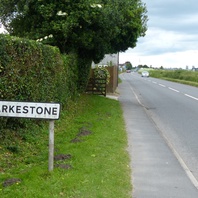
Viking Names
Swarkestone
Swarkestone, in the Repton and Gresley Hundred of Derbyshire, is derived from a Scandinavian male personal name which appears in Old Danish as Swerkir, in Old West Norse as Sorkir and in Old Swedish as Swerker. This is combined with Old English tun ‘farm, settlement’ and it is thus a hybrid name, as so many in the Trent Valley.
Read More

Viking Names
Ketsby
Ketsby, in the Hill Wapentake of Lincolnshire, comes from the Old Norse male personal name Ketill and the Old Norse element by ‘farmstead, village’. It is a joint parish with South Ormsby.
Read More
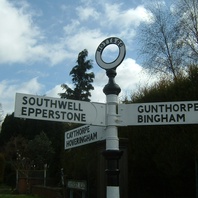
Viking Names
Caythorpe
Caythorpe, in the Thurgarton Wapentake of Nottinghamshire, probably comes from the Old Norse male personal name Káti and the Old Norse element þorp ‘outlying farm, settlement’. There is also a Caythorpe in Lincolnshire.
Read More
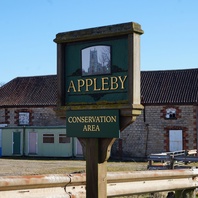
Viking Names
Appleby
Appleby, in the Manley Wapentake of Lincolnshire, is a hybrid name coming from Anglian æppel ‘an apple; fruit, tree-fruit; an apple-tree’ and Old Norse by ‘a farmstead, a village’. It is likely, from the situation of the village that this was formerly Appleton, in which the second element, originally Old English tun ‘a farmstead, village, estate’, was later replaced by by.
Read More

Viking Names
Gunness
Gunness, in the Manley Wapentake of Lincolnshire, is an Old Norse compound from the male personal name Gunni and nes ‘a ness, a headland, a promontory’. The name is topographically appropriate as it is located on a marked promontory on the River Trent. The same personal name also occurs in Gunby and Gunthorpe, Lincolnshire.
Read More

Viking Names
Risby
Risby, in the West Riding of Lindsey in Lincolnshire from Old Norse hrís ‘shrubs, brushwood’ and Old Norse by ‘A farmstead, a village’. This name is found as Rejsby and Risby in Denmark and it is possible that the place-name is transferred from there. If this is the case it was presumably because it is topographically appropriate for the English name as for the Danish. Risby is a joint parish with Roxby.
